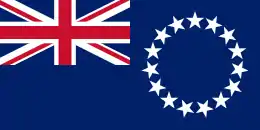Economy of the Cook Islands
The economy of the Cook Islands is based mainly on tourism, with minor exports made up of tropical and citrus fruit. Manufacturing activities are limited to fruit-processing, clothing and handicrafts.
As in many other South Pacific nations, the Cook Islands's economy is hindered by the country's isolation from foreign markets, lack of natural resources aside from fish, periodic devastation from natural disasters, and inadequate infrastructure.
Trade deficits are made up for by remittances from emigrants and by foreign aid, overwhelmingly from New Zealand. Efforts to exploit tourism potential, encourage offshore banking, and expand the mining and fishing industries have been partially successful in stimulating investment and growth.
Banking and finance
The Cook Islands has "Home Rule" with respect to banking, similar to Guernsey, Jersey and the Isle of Man.
This "Home Rule" banking confuses New Zealanders on vacation in the Cooks. Cook automated teller machines often fail to fully disclose the fact that the Cooks are not part of the New Zealand banking system, thus legally requiring banks to charge the same fees for withdrawing or transferring money as if the person was in Australia or the EU. The New Zealand dollar is the official currency of the Cook Islands, adding to the confusion. Cook Islanders are NZ citizens.
The banking and incorporation laws of the Cook Islands make it an important centre for setting up companies that are involved in global trade.
Economic statistics
- GDP
- Purchasing power parity - $183.2 million (2005 est.)
- GDP - real growth rate
- -.05% (2005); -1.2% (2014); -1.7% (2013). Growth in the Cook Islands has slowed due to a lack of infrastructure projects and accommodation capacity constraints in the tourism sector. Cook Islands economic activity is expected to be flat in FY2016; to grow by 0.2% in FY2017. Inflation 1.8% (FY2016); 2.0% (FY2017). Statistics Asian Development Bank
- GDP - per capita
- $9 100 (2005 estimate)
- GDP - composition by sector
-
- Agriculture: 78.9%
- Industry: 9.6%
- Services: 75.3% (2000)
- Population below poverty line
- 28.4% of the population lives below the national poverty line. Statistics 2016 Asian Development Bank
- Household income or consumption by percentage share
-
- Lowest 10%: NA%
- Highest 10%: NA%
- Inflation rate (consumer prices)
- 2.1% (2005 est.)
- Labor force
- 6,820 (2001)
- Labor force - by occupation
- Agriculture 29%, industry 15%, services 56% (1995)
- Unemployment rate
- 13.1% (2005)
- Budget
-
- Revenues: $70.95 million
- Expenditures: $69.05 million; including capital expenditures of $5.744 million (FY00/01 est.)
- Industries
- Fruit processing, tourism, fishing, clothing, handicrafts
- Industrial production growth rate
- 1% (2002)
- Electricity - production
- 28 GW·h (2003)
- Electricity - production by source
-
- Fossil fuel: 100%
- Hydro: 0%
- Nuclear: 0%
- Other: 0% (2001)
- Electricity - consumption
- 34.46 GW·h (2005 est)
- Electricity - exports
- 0 kW·h (2003)
- Electricity - imports
- 0 kW·h (2003)
- Oil consumption
- 400 bbl/d (64 m3/d) (2003)
- Agriculture - products
- Copra, citrus, pineapples, tomatoes, beans, pawpaws, bananas, yams, taro, coffee, pigs, poultry
- Exports
- $5.222 million (2005)
- Exports - commodities
- Copra, papayas, fresh and canned citrus fruit, coffee; fish; pearls and pearl shells; clothing
- Exports - partners
- Australia 34%, Japan 27%, New Zealand 25%, US 8% (2004)
- Imports
- $81.04 million (2005)
- Imports - commodities
- Foodstuffs, textiles, fuels, timber, capital goods
- Imports - partners
- New Zealand 61%, Fiji 19%, US 9%, Australia 6%, Japan 2% (2004)
- Debt - external
- $141 million (1996 est.)
- Economic aid - recipient
- $13.1 million (1995); note - New Zealand furnishes the greater part
- Currency
- 1 New Zealand dollar (NZ$) = 100 cents
- Exchange rates
- New Zealand dollars (NZ$) per US$1 - 1.4203 (2005), 1.9451 (January 2000), 1.8886 (1999), 1.8632 (1998), 1.5083 (1997), 1.4543 (1996), 1.5235 (1995)
- Fiscal year
- 1 April–31 March
Telecommunications
Telecom Cook Islands Ltd (TCI) is the sole provider of telecommunications in the Cook Islands. TCI is a private company owned by Spark New Zealand Ltd (60%) and the Cook Islands Government (40%). In operation since July 1991, TCI provides local, national and international telecommunications as well as internet access on all islands except Suwarrow. Communications to Suwarrow is via HF radio.
References
- CIA World Factbook, 2006
- Cook Islands banking explained from TVNZ program Fair Go .
